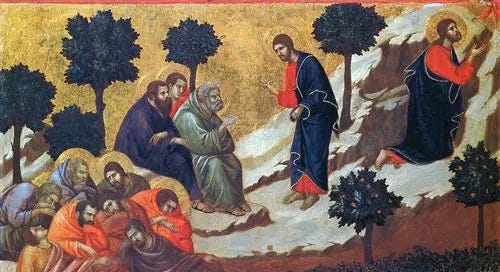Does Jesus have One Will or Two Wills? Does it even matter?
Why Dyothelitism is good news for you and me.
One of my goals on Substack is to post sermons that I preach and then follow up with articles that dive deeper into the Scripture or theological content I used for the sermon. My latest sermon, Thy Will Be Done, is about Jesus’ agony and prayer in the Garden of Gethsemane before His crucifixion. It is taken from Luke 22:31-46.
In the garden, Jesus is praying to the Father in intense agony. He is sweating so much that His sweat is like great drops of blood. While praying, Jesus says, “Father, if you are willing, remove this cup from me. Nevertheless, not my will, but yours, be done.” (Luke 22:42) In this prayer, Jesus indicates He has a will and His Father has a will. Rather than going with His will, Jesus chooses to submit to the will of the Father and die on the cross.
So, how do we make sense of the apparent tension between Jesus’ will and the Father’s will? That is where the historic doctrine of Dyothelitism comes in. Dyothelitism, a doctrine for which St. Maximus the Confessor had his tongue removed for confessing, teaches that Jesus has two wills. In His human nature, Jesus has a human will. Likewise, in His divine nature, Jesus has one divine will that He shares with the Father and the Holy Spirit. This doctrine, officially codified in the sixth ecumenical council at Chalcedon, teaches that the will is located in nature.
Allow me to explain futher: In His divine nature, Jesus can will to create something from nothing, destroy an entire planet with a single word, or make manna fall from the sky supernaturally. In His divine nature, Jesus cannot will to die or sleep, because the divine nature simply cannot die or sleep.
Likewise, Jesus’ human nature can will to sleep, eat, sacrifice His life, or choose to avoid death if possible. His human nature cannot will to be everywhere at once or create an entire planet because human beings can’t do that.
In the passage above, Jesus expresses that His human nature is crying out for self-preservation. After all, that is what human natures will and want. No one wants to die. Jesus is not being sinful, as He is totally without sin. It is natural for human beings to not desire a painful, awful, horrible death. Ultimately, what Jesus does is refuse to submit to His natural human will. Instead, He conforms His human will perfectly to the will of the Father! So, here is the great big question: Why does that matter to us?
If Jesus does not have a human will, then He is not fully human. Yet, we confess in the Nicene Creed that, “For us men and for our salvation he came down from heaven, and by the Holy Spirit was incarnate of the Virgin Mary, and became man.” Jesus became all that we are, yet without sin.
Why is it so important that Jesus became fully man? It is because, “for us men and for our salvation” He became man. Jesus became a human being to save human beings. If Jesus is anything less than human, then He is not our savior. As St. Gregory of Nazianzus says, “What is not assumed is not healed.” Since Jesus assumed all that we are, including our human wills, He has redeemed all that we are!
Because Christ took on your human will, He redeemed your human will. If, as Martin Luther says, all human beings are incurvatus in se, or curved in ourselves, then we are naturally selfish. Our wills are bent towards self and not God. In the garden, Jesus took our bent human wills and stretched them back out towards the love of God and neighbor. Thanks to Jesus, you and I can now say, “not my will but Yours be done.” Our wills are healed and we are free to choose God’s will, not our own!
In summary: Jesus took on all that you are to heal all that you are. Since Jesus assumed your human will, He has healed your human will. Because you are healed in Christ, you too can submit your human will to the perfect, holy, and glorious will of the Father!






I’m really glad you wrote this article, some points of theology can seem so ethereal and it can be hard to see why they might be relevant. It occurred to me that in having two wills Jesus is the True Human in that he unites his will to the Fathers even though his human will calls out for something different. By unifying the two wills of his two natures he maintains right relationship with the Fathers and is thus without sin.
This has given me some things to think about!
Interesting note. I’m curious as to who you had in mind (audience wise) when you wrote this. As a believer who has been in the faith for quite sometime it’s refreshing to reengage this reflection as it’s sometimes forgotten. But for those of us who are more mature in our faith, how does this still speak to the daily struggle to submit the flesh to the spirit and how how can we be encouraged to “work” out our salvation as if were to consistent dying to ourselves through spiritual practices not rooted in religiosity but in daily pursuit of God. I think that piece would be an interesting discussion as I think the difficulty isn’t so much in praying the “not my will but your will pray” to practically examining how can I consistently make Gods will my will for my own enjoyment and peace.